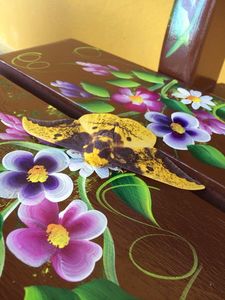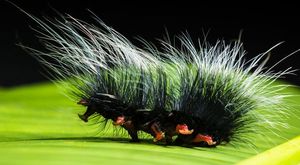The Moth
Submitted by Dan MacIsaac
I do not nominate the moth, pallid creature of night, to be any sort of talisman or totem. Moths are vandals, eating your heirloom woolens. These Visigoths deserve summary execution. No last meal of tartan kilt. That’s why I take a perverse pleasure in reading Frost’s “Design.” I gloat as the arachnid handily dispatches the moth. And I have done battle with moths, most recently in Latin America where I encountered an insect as illiterate and uncultured as Francisco Pizarro, invader of the Incas.
One warm evening, in the coffee lands of Panama, poor lighting in our ramshackle bungalow sent me outside where the patio light was clear and strong. Tucking a towel behind my head, I settled down on a cane recliner to read King Lear (I rarely travel without a play by the Bard bought in the bargain bin and usually heavily highlighted by a college hand). I hadn’t gotten even as far as the regal freak out scene where Lear banishes his fairytale daughter--when a tropical moth swooped down, bumping against my paperback. The moth, blaring sightless eyeballs on its wings, was determined to latch on to the book. But it wasn’t the poetry or the plot that captivated the bug. The moth was enamoured with the facsimile of fluttering wings, those riffling pages, along with the loud softcover art portrait of Lear, whose bleached beard and locks, tempest-tossed, must have looked irresistible to the lunar insect. Or was the binding glue some kind of pheromone? Or maybe a jealous rage had seized the creature? It tilted at the volume like Don Quixote at the windmill, antennae quivering like lances.
I was unable to drive off the persistent suitor. Swinging my book wildly, I retreated inside to the bathroom to strain my eyes in that waxen interior light. I read on and concluded that, clearly, Lear was a madman, spouting nonsense and cackling about “gilded butterflies.”
The next morning, my daughter found a showy dead butterfly on the ground and hoisted it on to a floral table for her to photograph. From the mug shot, it is hard to tell if the individual shown is the lunatic lover that wanted to do the nasty with the Wordsworth Edition of Lear. But the species looks spot on. Are there any lepidopterists out there that can provide a positive ID for type?
Generally, in literature, moths are the poor cousins to butterflies, a much more glamorous subject matter. Emily Dickinson observes that the butterfly is “favorably mentioned/ In Entomology” (“The butterfly obtains”) and praises “The Butterfly’s Numidian Gown/ With spots of Burnish roasted on.” Patrick Lane watches sunlit butterflies “pulling light into their wings” (“The Happy Little Towns”). Joe Rosenthall proclaims:
I get high on butterflies;
the way they loom in the air
and land on air-dromes
of petal
(“I Get High on Butterflies”)
Your CanLit News
Subscribe to Open Book’s newsletter to get local book events, literary content, writing tips, and more in your inbox
As a class, the butterfly remains the “it insect.” But neither moth nor butterfly is especially popular at the larval stage. Ogen Nash moans in ‘The Caterpillar”:
I find among the poems of Schiller
No mention of the caterpillar,
Nor can I find one anywhere
In Petrach or in Baudelaire.
Moths are relatively few in Canlit too. They find some refuge in Bliss Carmen’s verse. My experience with moths is vastly different from that of the Confederation poet, who sets a sombre mood in his “Pulvis et Umbra”:
There is dust upon my fingers,
Pale grey dust of beaten wings,
Where a great moth came and settled
From the night’s blown winnowing.
Carmen’s fanciful moth is a muse. My Panamanian version is a maniac, a besotted pest.
The views expressed in the Writer-in-Residence blogs are those held by the authors and do not necessarily reflect the views of Open Book.
Raised on Vancouver Island, Dan MacIsaac is a third-generation lawyer and served for ten years as a director on the board of the Environmental Law Centre at the University of Victoria. His poetry, verse translations, and fiction have appeared in a wide variety of literary journals and magazines. One of his stories was short-listed for the 2009 CBC Literary Awards, one of his poems received the 2014 Foley Prize from America Magazine, and another poem was short-listed for the 2015 Walrus Poetry Prize. He lives in Victoria. Cries from the Ark is his first poetry collection.




